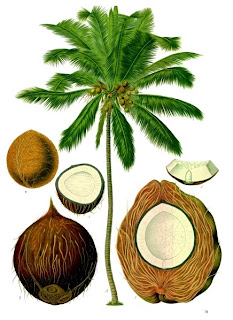"The vast majority of the fats and oils you eat, whether they are saturated or unsaturated or come from an animal or a plant, are composed of long-chain triglycerides. Probably 98 to 100% of all the fats we eat consist of LCT. Coconut oil is unique because it is composed predominately of MCT. The size of the fatty acid is extremely important because physiological effects of medium-chain fatty acids in coconut oil are distinctly different from the long-chain fatty acids more commonly found in our diet. It's the MCT in coconut oil that make it different from all other fats and for the most part gives it its unique character and healing properties. Almost all of the medium-chain triglycerides used in research, medicine, and food products come from coconut oil."
Medium-chain triglycerides (MCTs)"MCTs passively diffuse from the GI tract to the portal system (longer fatty acids are absorbed into the lymphatic system) without requirement for modification like long-chain fatty acids or very-long-chain fatty acids. In addition, MCTs do not require bile salts for digestion. Patients that have malnutrition or malabsorption syndromes are treated with MCTs because they do not require energy for absorption, utilization, or storage. Coconut oil is composed of approximately 66% medium-chain triglycerides. Other rich sources of MCTs include palm kernel oils and camphor tree drupes. The fatty acids found in MCTs are called medium-chain fatty acids. The names of the medium-chain fatty acids (and the corresponding number of carbons) found in MCTs are caproic acid (C6), caprylic acid (C8), capric acid (C10) and lauric acid (C12). MCTs are composed of a glycerol backbone and three of these fatty acids. The approximate ratios of these fatty acids in commercial MCT products derived from coconut oil are 2(C6):55(C8):42(C10):1(C12).[1]"
Medium chain triglycerides - Monograph in Alternative Medicine Review (2002)
"Up to 30 percent of MCTs are absorbed intact across the intestinal barrier and directly enter the portal vein. This allows for much quicker absorption and utilization of MCTs compared to LCTs. MCTs are transported into the mitochondria independent of the carnitine shuttle, which is necessary for LCT-mitochondrial absorption. Oxidation of MCTs provides 8.3 calories per gram."
"Medium Chain Triglycerides (MCTs): Beneficial Effects on Energy, Atherosclerosis and Aging" in Nutrition Review
"Partial Replacement of Dietary (n-6) Fatty Acids with Medium-Chain Triglycerides Decreases the Incidence of Spontaneous Colitis in Interleukin-10–Deficient Mice" in The Journal of Nutrition (2009)
" We conclude that partial replacement of dietary (n-6) FA with MCT decreases the incidence of colitis in a model of spontaneous intestinal inflammation and provide experimental arguments for a possible primary therapeutic effect of MCT in human Crohn's disease."

No comments:
Post a Comment